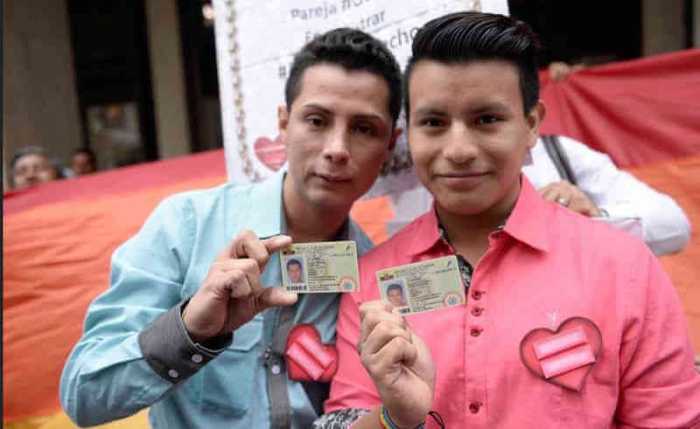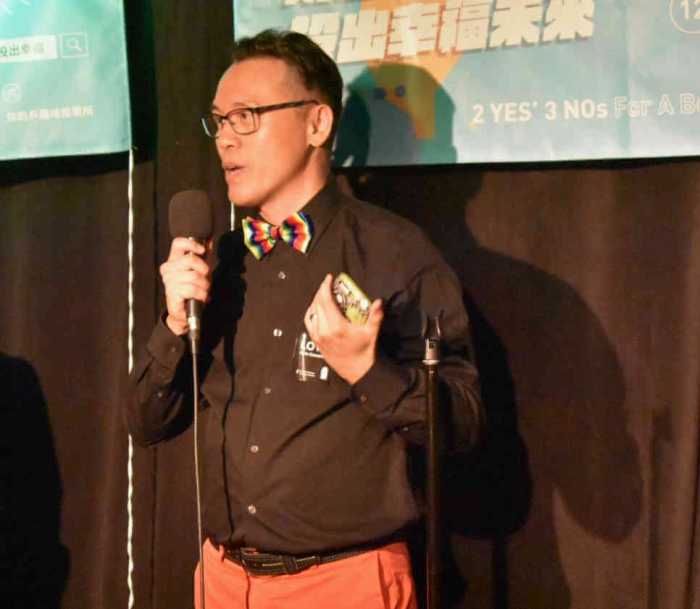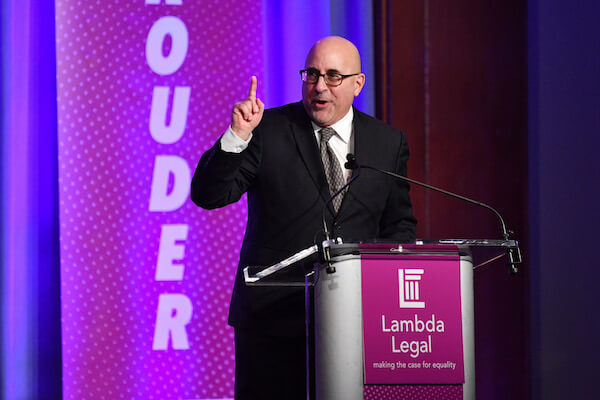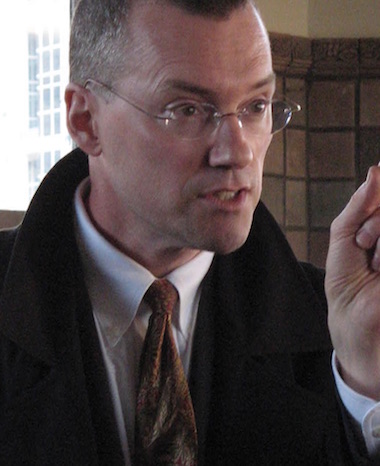Honoree William J. Thom (center), a founder of Lambda Legal and the first out gay judge in New York, with Matt Skinner, executive director of the Failla Commission, and Marcy Kahn, a justice in the Appellate Division and the Commission’s co-chair. | ANDY HUMM
The panelists in the ornate rotunda of the New York County Supreme Court were out gay and lesbian legal scholars, advocates, and judges at the highest echelons of the courts. But at the June 19 forum sponsored by the Richard C. Failla LGBTQ Commission of the New York State Courts — named for the late first out gay elected judge in the state, who won election in 1988 — these accomplished people were remembering a time when being out was impossible in their profession and celebrating “July 3, 1973: The Day the Court of Appeals Made Pride Possible in New York.”
Two historic decisions were handed down by New York’s highest court that day. Harris Kimball, an out gay lawyer who had been disbarred in Florida in the mid-1950s for a sodomy charge after a sting, was admitted to the New York bar despite being openly gay in a state that had a law against consensual gay sex until 1980. That same day, the court sided with William J. Thom, the co-founder of Lambda Legal, in approving its application for incorporation, overruling a lower court that deemed Lambda “neither benevolent nor charitable in ostensible purpose.”
Thom, who was also the first out gay judge in New York — appointed to the bench by Mayor Ed Koch in 1984 — was introduced by Justice Marcy Kahn, the first out lesbian appointed to the State Supreme Court in 1994 who now sits on the Appellate Division, who praised him for his courage and thanked him for being a mentor to her when she first served on the bench in 1987. She recalled a time when “there were no openly gay law students or lawyers, no public interest law firms committed to the rights of LGBT people.”
Kahn said, “We live in challenging and troubling times and by remembering this history we will be better able to protect our rights going forward.”
Failla Commission honors Lambda co-founder, pioneering out judge William J. Thom
Thom said that when he “arrived in New York in the 1960s, being gay was officially a mental illness, in 49 of 50 states we were criminals, in the City of New York gay bars were illegal and only able to exist through the corruption of the police department.” He recalled “mass arrests and sweeps of gay people, lawyers jacking up fees to defend them, and sharing lists of their clients with police to shake them down some more. Our political clout was less than zero. Elected officials wouldn’t let us in the door to discuss our issues,” and we were denied the “comfort” of religion or family support.
Court of Appeals Associate Justice Paul Feinman, the first openly LGBTQ member of the state’s highest bench. | ANDY HUMM
Thom spoke of the early gay and lesbian groups from the Mattachine Society and the Daughters of Bilitis in the 1950s to the Gay Liberation Front and Gay Activists Alliance in the post-Stonewall early 1970s and of his vision for “creating a vehicle” for fighting for gay rights in the courts. He picked the name “Lambda” because of the difficulties of getting a group with the word “gay” in it incorporated. He lost in the Appellate Division, earning a mention on the front page of the Law Journal that alerted his law firm colleagues to his homosexuality (though no one made an issue of it). An appeal was filed and Lambda won at the Court of Appeals 45 years ago.
“Lambda is not just the preeminent gay rights legal group, but the preeminent rights organization period,” Thom said.
Justice Rosalyn Richter, who was named to the Appellate Division in 2009 as one of two lesbians to break that barrier, spoke of coming out “in college in late 1974 during a wave of lesbian feminism… but [I] didn’t know any out gay lawyers.” She joined the Gay Academic Union “for professionals who were out” and Lesbian Feminist Liberation, but knew “no out professors at Barnard, one of the gayest places in America.” She was out in law school, “but it was less welcoming and there were no role models,” though she was grateful for “straight feminist professors” who were supportive.
“I heard of Lambda in my third year of law school,” Richter said, and at 24 she became its executive director and “only full-time employee, fielding hysterical calls from clients” who were subject to discrimination and arrests in parks. She said the Court of Appeals striking down the state’s anti-sodomy law in 1980 aided by Lambda’s amicus “made a tremendous difference… altering the perception of the risk of being out.”
“By being out,” Richter said, “we changed the world. We changed attitudes and hearts and minds. And don’t think it is over. It is just as important to be out, be involved, and speak up. Ask yourself: where would we be if Bill Thom and others had not been willing to put their names on a piece of paper with the word ‘gay’?”
Judge Paul Feinman, the first out gay person on the Court of Appeals, expressed “grave concerns” about this fraught time. “Our adherence to rule of law advanced us to a more perfect union,” he reminded the audience.
Feinman, a graduate of Columbia University, was at the University of Minnesota Law School from 1982 to 1985 when “the AIDS crisis was a full-blown horror,” but he sees it as a “critical moment in the history of the movement, bringing a sense of unity and purpose” in which “our lesbian sisters were there for us.” He started the LGBTQ group at the law school and worked in alliance with groups for Latinx and black law students.
Feinman said, “I never dreamed of being a judge, no less on our highest court,” but he was confirmed by the State Senate to that post one year ago. He reminded us that there are still “frightened people out there” among gay law students who we don’t see from our “New York bubble,” but also that we have the chance “to set an example for them.”
(Front row) Honoree William J. Thom with Arthur Leonard, a New York Law School professor and Gay City News contributor, (back row) Judge Daniel Anders of Philadelphia’s First Judicial District who is president of the International Association of LGBT Judges, marriage equality champion Evan Wolfson, Andrew Austin and his husband Michael Sonberg, a retired acting justice of the New York State Supreme Court. | ANDY HUMM
Arthur Leonard, professor at New York Law School and longtime chronicler of LGBTQ legal developments for Gay City News and his own LGBT Law Notes, gave an entertaining and instructive talk on Harris Kimball’s case, which finally, in 1973, made it okay to be an openly gay lawyer. Kimball was a civil rights lawyer in Orlando, “which did not make him popular with the local bar association” in segregated Florida, so acting on rumors that he was homosexual, they got the police “to set a trap for him using a handsome man.” Kimball got a felony conviction and disbarment “for committing an act contrary to good morals.”
Kimball tried to be readmitted in 1957 when the Florida Supreme Court reduced sodomy to a misdemeanor, but to no avail. He moved to New York where he did other work until deciding to return to law in the 1970s. After passing the state bar exam, he was ejected from the bar by the State Appellate Division’s Second Department because of his Florida disbarment. The Appellate Division said that that was not “necessarily a bar to admission, but we still had a law against gay sex in New York” and he would be prone to break that as a gay man. The dissenters in that 3-2 decision, according to Leonard, said that “in 1972 he cannot be considered unfit merely because he was an avowed homosexual and the Court of Appeals agreed in 1973 aided by an amicus from [the Gay Activists Alliance] by E. Carrington Boggan.
The court wrote, “While appellant’s status and past conduct may be now and has been in the past violative of accepted norms, they are not controlling, albeit relevant, in assessing character bearing on the right to practice law in this state.” Without using the word “gay” or “homosexual,” Leonard noted, the court opened the door to out gay lawyers.
Rachel Tiven, Lambda’s current president, said they now have “more than 100 staff and six offices nationwide, including three dozen practicing lawyers.” She cited Lambda’s illustrious alumni — Evan Wolfson of Freedom to Marry who was on hand, Columbia law professor Suzanne Goldberg, Governor Andrew Cuomo’s counsel Alphonso David, and Judge Richter. Tiven expressed pride in how the group’s victory in Romer v. Evans in 1996 — challenging Colorado’s law forbidding state and local gay rights protections — set a precedent that “animus cannot be a legitimate reason for government actions.” The case, she noted, is cited in cases against Trump’s Muslim ban.
Lambda, Tiven said, is focused on “protecting marriage equality” especially from religious exemptions and worries that the Masterpiece Cakeshop decision “suggests that there is a different kind of marriage that LGBT people get — ‘gay marriage’ — when there is just marriage before the law for everyone.” The group’s second focus is on “expanding the reach of sex discrimination law” to encompass protection on the basis of sexual orientation and gender identity. She is alarmed at Trump putting “judges who are so biased” on the federal bench but optimistic about the alliances Lambda has formed with the NAACP and Mexican-American legal defense groups as well as the Leadership Conference on Civil and Human Rights.
Michael R. Sonberg, a retired acting justice of the New York Supreme Court, recounted how Thom came to be appointed by Koch in 1984 as the state’s first out gay judge and how the Gay Activists Alliance fought for incorporation from 1970 until 1973, winning when the Appellate Division finally ruled “the word ‘gay’ was not obscene or vulgar.” Sonberg marveled at how “we see kids coming out now as pre-teens,” but cautioned that coming out still often means “you realize you are different from everyone else in your family.” He added, “They need our love and support.”
The LGBTQ legal community members’ nurturing of one another was on full display at this historic forum, showing how far their work has come within the lifetimes of its pioneers.





































